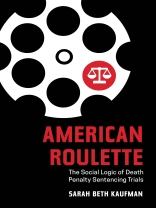As the death penalty clings to life in many states and dies off in others, this first-of-its-kind ethnography takes readers inside capital trials across the United States. Sarah Beth Kaufman draws on years of ethnographic and documentary research, including hundreds of hours of courtroom observation in seven states, interviews with participants, and analyses of newspaper coverage to reveal how the American justice system decides who deserves the most extreme punishment. The “super due process” accorded capital sentencing by the United States Supreme Court is the system’s best attempt at individuated sentencing. Resources not seen in most other parts of the criminal justice system, such as jurors and psychological experts, are required in capital trials, yet even these cannot create the conditions of morality or justice. Kaufman demonstrates that capital trials ultimately depend on performance and politics, resulting in the enactment of deep biases and utter capriciousness.
American Roulette contends that the liberal, democratic ideals of criminal punishment cannot be enacted in the current criminal justice system, even under the most controlled circumstances.
Cuprins
Acknowledgments
Introduction
PART I. THE SOCIAL LOGIC OF DEATH PENALTY CASES
1. Constructing Capital Homicide
2. Governing Capital Sentencing
3. The Capital Sentencing Field
PART II. THE SOCIAL LOGIC OF DEATH PENALTY TRIALS
4. Performing Punitive Citizenship
5. Performing Mercy
6. Performing Danger
7. Mourners in the Court
Conclusion
Appendix A. Methodology
Appendix B. Court Cases Cited
Notes
Bibliography
Index
Despre autor
Sarah Beth Kaufman is Assistant Professor of Sociology at Trinity University, San Antonio, Texas.












